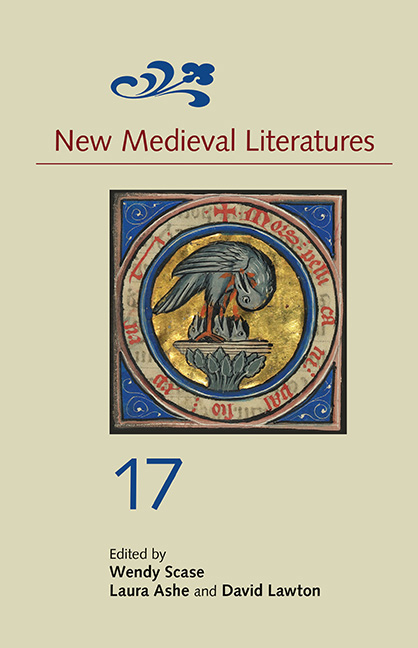Book contents
- Frontmatter
- Contents
- List of Illustrations
- 1 The Lives of Nytenu: Imagining the Animal in the Old English Boethius and Soliloquies
- 2 Disruptive Things in Beowulf
- 3 Pidgin Poetics: Bird Talk in Medieval France and Occitania
- 4 Performing Friendship in Richard Rolle's Incendium amoris
- 5 Damaged Goods: Merchandise, Stories and Gender in Chaucer's Man of Law's Tale
- 6 Gower's Bedside Manner
- 7 Vitreous Visions: Stained Glass and Affective Engagement in John Lydgate's The Temple of Glass
- 8 The Idle Readers of Piers Plowman in Print
3 - Pidgin Poetics: Bird Talk in Medieval France and Occitania
Published online by Cambridge University Press: 09 May 2017
- Frontmatter
- Contents
- List of Illustrations
- 1 The Lives of Nytenu: Imagining the Animal in the Old English Boethius and Soliloquies
- 2 Disruptive Things in Beowulf
- 3 Pidgin Poetics: Bird Talk in Medieval France and Occitania
- 4 Performing Friendship in Richard Rolle's Incendium amoris
- 5 Damaged Goods: Merchandise, Stories and Gender in Chaucer's Man of Law's Tale
- 6 Gower's Bedside Manner
- 7 Vitreous Visions: Stained Glass and Affective Engagement in John Lydgate's The Temple of Glass
- 8 The Idle Readers of Piers Plowman in Print
Summary
A mon ops chant et a mos ops flaujol,
Car homs mas ieu non enten mon lati;
Atretan pauc com fa d'un rossinhol
Entent la gent de mon chant que se di.
(‘I sing and play the flute for myself.
For no man except me understands my language.
As little as they understand the nightingale
do the people understand what my song says.’)
Peire Cardenal, ‘Les amairitz, qui encolpar las vol’‘Pa. Pa pa. Pa pa pa. Pa pa pa pa pa pa pa pa, pa pa pa pa pa pa pa pa.’ These monosyllabic interjections, inarticulate yet instantly recognizable to opera lovers everywhere, represent Papageno and Papagena's expressions of delight upon their belated unification in Mozart's Die Zauberflöte. At first, they sound like something akin to an emotioninduced speech impediment. It is easy to imagine that the two bird-like characters, gazing into each other's eyes at long last, attempt lovingly to enunciate each other's names, but make it no further than the initial two syllables. In deconstructing their names in this way, Mozart's librettist, Schickaneder, reveals two aspects of avian language, at least as perceived by human animals. First, he flags up the imitative nature of many birds’ names. Second, the scene's proliferation of disjointed ‘pa's draws attention to the act of acoustic reduplication at the heart of most avian vocalizations. Even in the case of birds with complex songs or with a large repertory, birds are likely to repeat each song, or song section, a certain number of times. And this propensity for repetition is not limited to songbirds: as anyone who has lived in the vicinity of a blue jay's nest knows, vocalizations that would more likely be described as calls rather than songs are often repeated at brief intervals. Moreover, that Papageno and Papagena call out the same syllables to each other may be intended to conjure up the highly mimetic nature of parrots’ vocalizations – an interpretation reinforced by the musical echoes in Mozart's dialogue. In any case, the framing of the duet as a series of calls and responses can be read as an evocation of the antiphonal duetting common in many bird species.
I dwell on this scene in Die Zauberflöte because it demonstrates how repeated iterations of a syllable invite us to hear that syllable differently.
- Type
- Chapter
- Information
- New Medieval Literatures 17 , pp. 62 - 80Publisher: Boydell & BrewerPrint publication year: 2017



